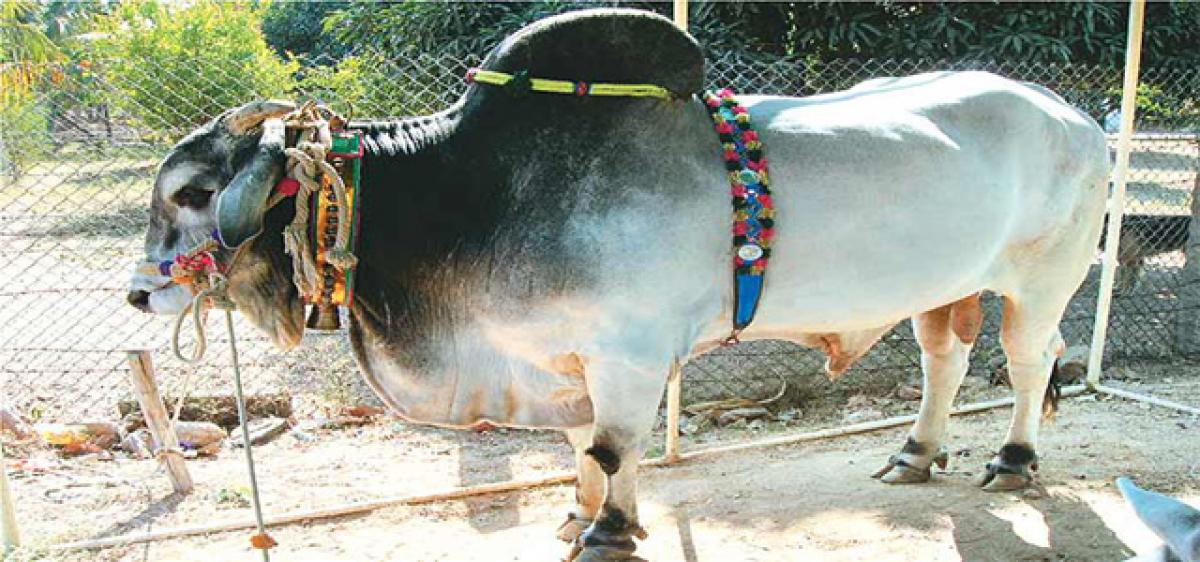Live
- First Impressions and Unboxing of the MacBook Pro M4: A Powerhouse for Professionals and Creators
- China Gears Up for Potential Trade War Amid Trump’s Tariff Threats
- Small Farmers Gain Less by Selling to Supermarkets: Study Reveals
- Why Despite the Controversy, America Is Anticipating the Mike Tyson vs. Jake Paul Fight
- Sanju Samson and Tilak Varma Shine: Record-Breaking Feats in 4th T20I Against South Africa
- India Urges $1.3 Trillion Annual Climate Support for Developing Nations
- Bad air: 106 shuttle buses, 60 extra Metro trips planned to make Delhiites give up cars
- WHO reports declining monkeypox cases in Congo
- CM Attends Kotideepotsavam on Kartika Purnima
- PKL Season 11: Raiding trio of Devank, Ayan, Sandeep help Patna Pirates rout Bengal Warriorz
Just In

The Sri Venkateswara Veterinary University (SVVU) here is poised to give a new lease life to the country’s two endangered cattle breeds, Ongole and Punganur, by executing a new project on animal reproduction using the latest in-vitro fertilization technology.
Tirupati: The Sri Venkateswara Veterinary University (SVVU) here is poised to give a new lease life to the country’s two endangered cattle breeds, Ongole and Punganur, by executing a new project on animal reproduction using the latest in-vitro fertilization technology.
The technology involves transfer of embryo to surrogate mother cows for conservation and propagation of indigenous cattle of the State, particularly Ongole and Punganur breeds.
This advanced research has been taken up at the behest of Vice Chancellor Dr Manmohan Singh, a veterinarian and principal secretary to Animal Husbandry Department.
On January 10, a Memorandum of Understanding was signed between JK Trust, Hyderabad and SVVU, Tirupati for implementation of the project at Amaravati, ushering in a new era in the conservation and promotion of the Ongole and Punganur breeds which are close to extinction.
This project is being implemented at the Livestock Research Station, Lam Farm Guntur of SVVU campus, involving an outlay of Rs 491.34 lakh.
A viable solution to multiply the Ongole and Punganur cattle at a faster rate was found in IVF-ETT. During normal reproduction, a cow could produce barely one calf in a year and 8-10 calves in her lifetime.
With the use of IVF-ET, it is possible to produce 150 embryos from elite female and 50-60 calves per year. Thus, the reproductive ability in cow with low reproductive capacity is enhanced by 50 times in one year through IVF-ETT technology as a surrogate mother.
One of the salient features of this method is faster multiplication of rare and genetically superior animals with the production of 50-60 calves from one cow per year. This will be achieved by effective utilization of surrogate mothers with the available large number of elite bulls for frozen semen production.
The project will be implemented by the JK Trust for a period of 12 months. Four scientists from SVVU would be trained on this new technology by the JK Trust.
The facility for aspiration of oocytes from Ongole and Punganur donor cows once in a week is available at the Lam Farm. In all, 130 aspirations would be performed in a month with weekly intervals.
The total number of aspirations targeted is 1,560 (103 aspirations per month). Ongole and Pungunur embryo produced would be preserved and handed over to SVVU.
The overall objective is to ensure that indigenous but fast dwindling resource of Ongole and Punganur breeds would survive. Unfortunately these versatile triple-purpose indigenous resources are at the danger of survival in their endemic habitat.
In the case of Ongole breed, the breedable population, which used to be more than a lakh in the early part of the 20th century, has now been reduced to a few thousands, with only 12-48% cows possessing more than 70% breed characteristics.
The Punganur breed is among the world’s smallest humped cattle that originated in Chittoor district. The Punganur breed is on the verge of extinction, with only some 60-odd female animals remaining.
Director extension Dr D Srinivasulu told The Hans India: “There is an urgent need for a rapid multiplication of these rare animals with desirable traits and we will kick off this surrogate cow mother project as early as possible at the university research station for the protection of indigenous varieties of Ongole and Punganur cows and bulls.

© 2024 Hyderabad Media House Limited/The Hans India. All rights reserved. Powered by hocalwire.com







